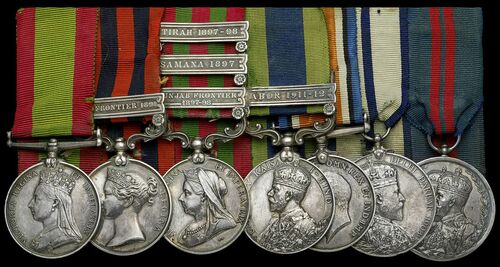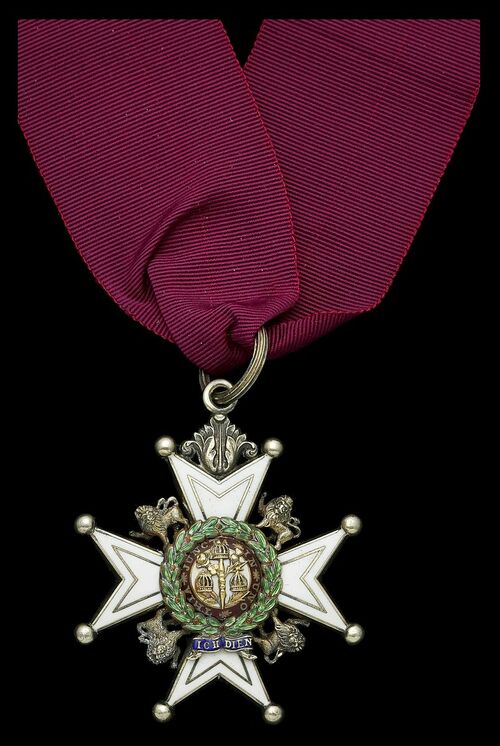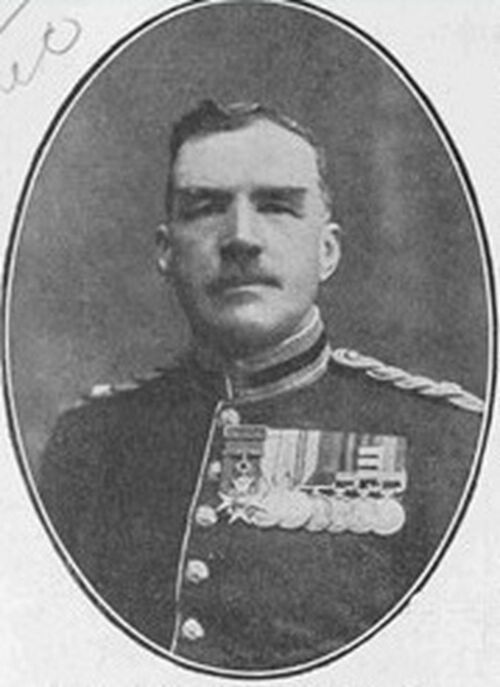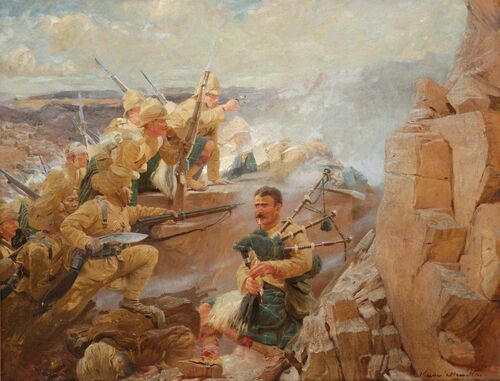Auction: 23002 - Orders, Decorations and Medals
Lot: 91
The rare 'Abor 1911-12' C.B. group of seven awarded to Major-General D. C. F. MacIntyre, 2nd (Prince of Wales's Own) Gurkha Rifles, Bengal Staff Corps and 78th Foot, who was Mentioned in Despatches on no less than four occasions during an action-packed career
He was notably also further recommended for both the Victoria Cross (Dargai Heights) and the Distinguished Service Order (Manipur) - the former action saw MacIntyre being perhaps the first to scale the Heights besides exposing himself to a hail of fire in order to rescue the body of his comrade and 'great friend in the Regiment' Lieutenant G. M. Wylie
The Most Honourable Order of the Bath, Companion's C.B. neck Badge, silver-gilt and enamel; Afghanistan 1878-80, no clasp (2nd Lieut: D. C. F. MacIntyre. 78th Foot); India General Service 1854-95, 1 clasp, N.E. Frontier 1891 (Captn. D. C. F. MacIntyre. S.C.); India General Service 1895-1902, 3 clasps, Punjab Frontier 1897-98, Samana 1897, Tirah 1897-98 (Capt: D. C. F. MacIntyre 2d Bn. 2d Goorkhas), official correction to ‘Goorkhas’; India General Service 1908-35, 1 clasp, Abor 1911-12 (Colonel D. C. F. MacIntyre Staff); British War Medal 1914-20 (Maj. Gen. D. C. F. MacIntyre); Delhi Durbar 1903, silver, unnamed; Delhi Durbar 1911, silver, unnamed, mounted court-style as worn, very fine, together with a Regimental Shooting Medal, silver cross inscribed, ‘BPRA 1900 C in C’s Cup, 2nd Bn. 2nd PWO Goorkhas’ (8)
C.B. Gazette of India 23 May 1912.
In reference to his Recommendation for the V.C. and D.S.O., the best source is the St James's Gazette of 6 January 1898:
'Captain Macintyre, of the 2nd Goorkhas, whose bravery in carrying off the body of Lieutenant Wylie in one of the recent frontier engagements has been brought to the notice of the authorities with a view to his receiving the Victoria Cross, has seen a good deal of active service. At the time of the affair at Manipur, a few years ago, he was acting as Commandant of Frontier Police, and for his prompt and efficient services on that occasion he was thanked by the Indian Government and recommended for the Distinguished Service Order. Captain Macintyre was one of the first to cross the ridge at Dargai on the 20th of October, when his Regiment was isolated for a considerable time till the Gordon Highlanders so gallantly came to their support.'
Donald Charles Frederick MacIntyre was born on 17 April 1859, the eldest son of General John MacKenzie MacIntyre, R.A., J.P., of Fortrose, Rossshire, and nephew of Major-General Donald MacIntyre, who earned the Victoria Cross. On leaving Sandhurst he entered the British Army in 1879, serving as a 2nd Lieutenant in the 78th Regiment and taking part in the Second Afghan War. During that campaign he was noted as having carried the Colours for General Sir Frederick Roberts on the march from Kabul to Kandahar.
Manipur Expedition
Transferred to the Bengal Staff Corps in 1882, MacIntyre became a Captain in the Indian Staff Corps in 1890. In the autumn of 1890 the semi-independent state of Manipur, lying in the hill country between India and Burma, was governed by a Maharajah subject to the control of a British Resident. Dissatisfied with these arrangements, the Senapati, or Commander-in-Chief, led a palace coup, deposing the Maharajah and installing one of his own brothers on the throne. Although considerable freedom was granted to the native states in the management of their own affairs, this rebellious act called for the involvement of the Governor-General of India who at once instructed the Chief Commissioner of Assam, James Wallace Quinton, to go to Manipur with a body of troops and settle the matter on the merits of the case.
Mr Quinton arrived at the Residency in Manipur accompanied by 400 Gurkhas under the command of Colonel Skene on 22 March 1891 and, having decided on the arrest and banishment of the Senapati, invited him to a meeting at the Residency for the purposes of executing his capture. Suspecting the trap, however, the native chief declined to attend on account of ill-health and Quinton then, unwisely given the circumstances, resolved to seize him in his palace. Upon attacking and entering the palace on 24 March, it was discovered that the Senapati had fled and fighting ensued, continuing all day. The British forces finally withdrew, retiring on the Residency which they held under a heavy fire for several hours. With ammunition running critically low, Quinton decided to pursue a truce with the Senapati and so together with Frank Grimwood - the Resident - Colonel Skene and several officers he agreed to go to the palace unarmed for the purposes of negotiating a settlement. What exactly occurred at the palace is not known but the talks failed and the British party were later murdered, with Grimwood reportedly being speared to death. The remaining British officers and the Resident’s wife Mrs Ethel Grimwood effecting an escape from the Residency in the dead of night, eventually reached the safety of a British outpost several miles away.
Thus it was the Manipur expedition began with various columns sent forth. One of those of course led to the unique Victoria Cross awarded to Lieutenant C. J. W. Grant for his remarkable Capture and Defence at Thobal. Macintyre certainly played his part and was mentioned in despatches (G.G.O. 585 of 1891, refers). Frontier and Overseas Expeditions from India, gives more detail:
‘It was first intended that the main advance should be from Kohima, as it was anticipated that the Cachar Column would be delayed by the difficulties of the route and of transport. Two preliminary movements were ordered. The first was under command of Captain MacIntyre, who advanced with 200 police and burned Mao Thana, after a sharp skirmish with the enemy, on the 31st March: a prompt action which was considered very creditable to Captain MacIntyre by the Commander-in-Chief, and which had the effect of clearing most of the road from Kohima to Manipur’.
Details of his exploits made the press back home, including the Glasgow Evening News of 18 April 1891:
'Among the officers who are at present distinguishing themselves in the Manipur district is Captain Donald Macintyre, a brother of the famous Scottish prima donna [Margaret Macintyre]...on hearing news of the disaster to the British troops at Manipur he at once started with 150 police and cleared out the stockade at Mao, which was garrisoned by 250 men, and cut off the retreat of the fugitives. According to the latest private telegrams, he has pushed his way with his force some twenty miles further from the scene of his earliest victory and further news of success is daily expected.'
North-West Frontier
Thence Macintyre went onto the Frontier and served in the operations on the Samana during August-September 1897 and in the relief of Gulistan. In the Tirah expedition, he served in the actions at Chagru Kotal, Darga and of the Sampagha and Arhanga Passes; the operations in the Waran Valley and action of 16 November 1897; the operations at and around Dwato and action of 24 November 1897; operations against the Khani Khel Chamkannis, and operations in the Bora Valley, 7-14 December 1897. For his services he was twice mentioned in despatches (G.G.O.58 and 244 of 1898) and received the brevet of Major. For his services at the action at Wana, not only was he mentioned in despatches but was considered for the Victoria Cross. The Times of 5 January 1898 reported:
‘The gallantry of Capt D. C. F. Macintyre and Surg. Capt W. Selby, 1st Batt., 2nd Gurkhas, has been brought specially to notice in order that their claims may be considered in connexion with the award of the Victoria Cross; Capt Macintyre saved the body of Lieut. Wylie from mutilation by carrying it away under a very heavy fire when in command of the rear guard retiring from Waran. On the same occasion Surg. Capt Selby displayed signal gallantry by saving the life of a wounded Gurkha who, but for his assistance, would have fallen into the hands of the enemy’.
And in The Times of 6 January 1898:
'Sir- Under the head of "Military Intelligence" you refer this morning to the gallantry of the 2nd Gurkhas in "Saving from mutilation" the body of his brother officer, Lieutenant Wylie - an act of bravery which you say has been specially brought to the notice of the authorities. Although, of course it in no way adds to the actual bravery of the exploit, it should, I think, be known that when Captain Macintyre went back in the face of the enemy's fire on hearing that a comrade had been hit, he did so in the hope of not merely carrying away his body, but of saving his life. That this was so is made clear by the following extract form a private letter written by Captain Macintyre immediately after the event. He says - " I came back on Wylie's Company, and a man of ours told me a Sahib had been hit .... I only thought he was wounded .... I rushed to his side and found he (Wylie) was dead." I am Sir your obedient servant, Ronald M'Neil’.
The Campaign in Tirah 1897-1898 specifically mentions his gallant act:
'His head [Lieutenant Wylie] must have shown above the rock, for he was instantly shot through the brain, and, of course, killed on the spot. Captain Macintyre, his great friend in the Regiment, seeing him drop, at once went out under a heavy fire and brought in his body, which was carried to Camp Maidan the same evening.'
The end result was that - despite his fine action - he missed out on the Victoria Cross, whilst Piper Findlater earned his. His name featured on the short list of 'Special Mentions' for this gallant action and he was further rewarded with a Brevet Majority specifically for the action.
Abor 1911-12
Serving as a Colonel on the Staff during the operations in Abor Country, 1911-12, MacIntyre was again mentioned in despatches (Gazette of India 23 May 1912, refers) and was rewarded with his first decoration. Despatch Describing the Operations Against the Abors, by Major-General H. Bower (London Gazette 16 July 1912, refers), records:
‘Colonel D. C. MacIntyre, Indian Army, Base Commandant and Inspector, Line of Communications, has performed his duties to my complete satisfaction. He conducted missions to the Panggi and Padam countries, being in both political and military charge. Largely owing to his tact in dealing with savage people these missions were most successful and resulted in the establishment of excellent relations and a large increase to our geographical knowledge’.
He commanded the Jhelum Brigade, Northern Army, 1912-14, and attained the rank of Major-General in May 1914. During the Great War MacIntyre served as a Staff Officer at the War Office and was also Commandant of the National Motor Volunteers alongside The Lord Desborough (President) and General Sir O'Moore Creagh (Military Advisor). MacIntyre, who had been married at Dehra Dun in February 1898, died in Brussels on 19 October 1938; sold together with copied research and newspaper extracts.
Subject to 20% VAT on Buyer’s Premium. For more information please view Terms and Conditions for Buyers.
Sold for
£11,000
Starting price
£5500
Sale 23002 Notices
Group of eight (not seven) comprising campaign group & C.B., thus nine in total with the Regimental Medal.













